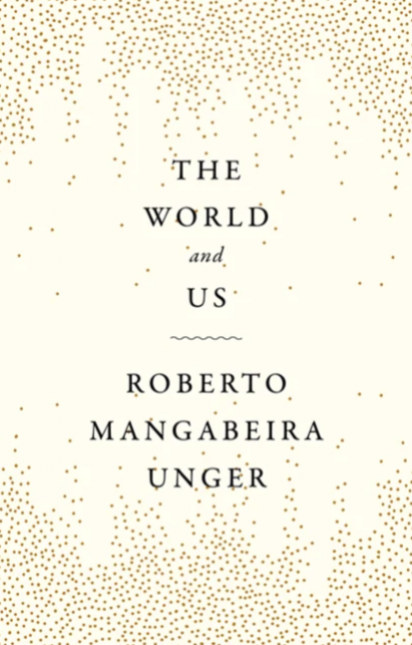The World and Us
- By Roberto Mangabeira Unger
- Verso Books
- 640 pp.
- Reviewed by Michael Maiello
- March 21, 2024
A renowned philosopher takes on the universe.

In The World and Us, Brazilian philosopher, legal scholar, and political adviser Roberto Mangabeira Unger practices philosophy the old-fashioned way, by asking readers to consider the biggest questions of the universe and ourselves. The book is a culmination of decades of work and combines ontology with social thought to make an argument in favor of human transcendence over our finite and indecipherable lives. Unger’s goal is to create an actionable philosophy for life that doesn’t attempt to function as a “super science,” even as it challenges many commonplace notions of what could be broadly described as a scientific worldview.
At the heart of the book are three principles: First, echoing the pre-Socratic philosopher Heraclitus, he argues that the universe is constantly changing and that even change changes. Second is that time is real and a consequence of the universe’s constant change. Third is that we self-aware humans are limited in our capacity to understand the universe around us yet cognizant of our mortality. As a consequence, he writes, “Our existence is vertiginous and dreamlike.”
This idea of a universe in constant flux recurs throughout Unger’s argument and grows more provocative the longer it’s considered. “Nothing in the world is forever,” the author writes, “not even its most elementary constituents and its most stable regularities: laws, symmetries and constants. Everything changes sooner or later, including change itself.” This means that our typical notions of how smart people inquire about reality and relate its truths merit reexamination.
Consider mathematics: We tend to view it as a discipline that removes the world’s veils and reveals deeper veracities. Laypeople are often told that language and art can merely approximate reality; a deeper understanding is mathematical. Yet Unger rejects this because in a reality marked by constant change, there are no unbreakable laws or inexorable forces of nature that guide everything once and forever. This cuts to the heart of what many of us imagine the philosopher, the scientist, or some combination of the two does day in and day out: search for hidden constants that make sense of the swirl.
But there are no constants, says Unger. Only swirl. And compounding our confusion are the limitations of our minds and senses. He writes:
“We are conscious: that is to say, we are aware of being alive. Our awareness of being alive includes being embodied. We cannot view the vicissitudes of the body as if they were alien to us; they penetrate every aspect of the experience of being alive and it is through them that we encounter the world.”
So, here we are, knowingly alive in a universe where the only rule is change, embodying an instrument of little understanding aside from our own mortality. It makes an extremely personal issue out of the pressures of time, which is always short.
It’s not often a philosophical inquiry that starts with metaphysics and ontology — delivering fatal questions to disciplines like math, quantum physics, and cosmology — winds up as a discourse on ethics and politics, but Unger is very much a citizen of our world. Having served twice as Brazil’s minister of strategic affairs and the man that country’s president, Lula da Silva, once called his “minister of ideas,” Unger has a practical and passionate interest in helping people live fuller and freer lives that’s closely linked with his notions about what we can know and how the universe operates.
In the face of constant change, imperfect knowledge, and finite existence, Unger suggests we strive for a kind of transcendent freedom that — because it acknowledges our interdependence and the consequent necessity of love — doesn’t devolve into a call for shallow anarchy. In short (and this very much simplifies arguments that fill over half the book), Unger believes society is too oppressive, and that the economy forces people into roles that cause them to experience many deaths over a lifetime. For him, the ultimate state of being is to live with enough freedom so as to die only once.
The World and Us ruminates deeply while maintaining a readability often lacking in specialized, academic philosophy. Unger has written a book for the rest of us, after all. If he seeks our understanding, it’s only so we might enjoy a better life ahead.
Michael Maiello is an author, journalist, and playwright. He worked for 10 years as a writer and editor at Forbes, and his work has appeared in McSweeney’s, the New Yorker, the New York Times, and other publications. Find his free Substack here.

